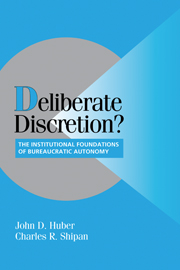Book contents
- Frontmatter
- Contents
- List of Tables
- List of Figures
- Preface
- 1 LAWS, BUREAUCRATIC AUTONOMY, AND THE COMPARATIVE STUDY OF DELEGATION
- 2 RATIONAL DELEGATION OR HELPLESS ABDICATION? THE RELATIONSHIP BETWEEN BUREAUCRATS AND POLITICIANS
- 3 STATUTES AS BLUEPRINTS FOR POLICYMAKING
- 4 A COMPARATIVE THEORY OF LEGISLATION, DISCRETION, AND THE POLICYMAKING PROCESS
- 5 LEGISLATION, AGENCY POLICYMAKING, AND MEDICAID IN MICHIGAN
- 6 THE DESIGN OF LAWS ACROSS SEPARATION OF POWERS SYSTEMS
- 7 THE DESIGN OF LAWS ACROSS PARLIAMENTARY SYSTEMS
- 8 LAWS, INSTITUTIONS, AND POLICYMAKING PROCESSES
- APPENDIX A MMC LAWS USED IN CHAPTER 3
- APPENDIX B POLICY CATEGORIES USED FOR MMC LAWS IN CHAPTER 3
- APPENDIX C PROCEDURAL CATEGORIES USED FOR MMC LAWS IN CHAPTER 3
- APPENDIX D THE FORMAL MODEL OF DISCRETION
- References
- Author Index
- Subject Index
- Titles in the series
7 - THE DESIGN OF LAWS ACROSS PARLIAMENTARY SYSTEMS
Published online by Cambridge University Press: 05 June 2012
- Frontmatter
- Contents
- List of Tables
- List of Figures
- Preface
- 1 LAWS, BUREAUCRATIC AUTONOMY, AND THE COMPARATIVE STUDY OF DELEGATION
- 2 RATIONAL DELEGATION OR HELPLESS ABDICATION? THE RELATIONSHIP BETWEEN BUREAUCRATS AND POLITICIANS
- 3 STATUTES AS BLUEPRINTS FOR POLICYMAKING
- 4 A COMPARATIVE THEORY OF LEGISLATION, DISCRETION, AND THE POLICYMAKING PROCESS
- 5 LEGISLATION, AGENCY POLICYMAKING, AND MEDICAID IN MICHIGAN
- 6 THE DESIGN OF LAWS ACROSS SEPARATION OF POWERS SYSTEMS
- 7 THE DESIGN OF LAWS ACROSS PARLIAMENTARY SYSTEMS
- 8 LAWS, INSTITUTIONS, AND POLICYMAKING PROCESSES
- APPENDIX A MMC LAWS USED IN CHAPTER 3
- APPENDIX B POLICY CATEGORIES USED FOR MMC LAWS IN CHAPTER 3
- APPENDIX C PROCEDURAL CATEGORIES USED FOR MMC LAWS IN CHAPTER 3
- APPENDIX D THE FORMAL MODEL OF DISCRETION
- References
- Author Index
- Subject Index
- Titles in the series
Summary
In the previous chapter, we operationalized the abstract explanatory variables in our theory within the context of presidential systems. The important role of all the U.S. states in Medicaid policymaking, along with sudden changes in the Medicaid policymaking environment in the mid-1990s, allowed us to study how a large number of states legislated on the same basic issue. By measuring all relevant legislation on this specific topic, we found that the political and institutional contexts had a significant impact on how legislative majorities designed statutes. Factors like divided government, divided legislatures, legislative professionalism, and legislative vetoes influenced the level of policy details that states included in their legislative statutes.
We now evaluate our theory in parliamentary systems, where there is a melding of legislative and executive powers. Our parliamentary tests must differ from our tests in the U.S. states in two significant respects. The first concerns how we measure discretion. Since our theory concerns how the political context affects the way different political systems design legislation on the same basic issue, we must have a means to control for the nature of the issue. Across the 19 parliamentary democracies that we examine, there obviously does not exist the transnational equivalent of the Medicaid program. That is, there is no single issue that all of these different countries had to address at the same time. We therefore cannot proceed by collecting all legislation on the relevant issue, as we did for the U.S. states, and instead must find a different strategy to control for the nature of the policy issue.
- Type
- Chapter
- Information
- Deliberate Discretion?The Institutional Foundations of Bureaucratic Autonomy, pp. 171 - 209Publisher: Cambridge University PressPrint publication year: 2002



